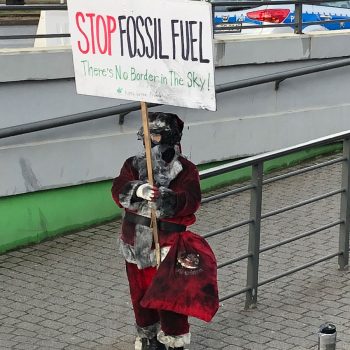- About
- Topics
- Picks
- Audio
- Story
- In-Depth
- Opinion
- News
- Donate
- Signup for our newsletterOur Editors' Best Picks.Send
Read, Debate: Engage.
| topic: | Climate Change |
|---|---|
| located: | USA |
| editor: | Yair Oded |
Republican and Democratic senators drafted a bill aimed at curbing emissions of Hydrofluorocarbons, commonly referred to as HFCs, in a rare bi-partisan attempt to tackle the climate crisis. The plan was forged despite the Trump administration’s objection to the move, The Washington Post reported.
HFCs are powerful greenhouse gasses commonly used as refrigerants – in air conditioners, refrigerators, and cars, among other products – that are considered to be one of the greatest drivers of global warming. The chemicals were introduced in the late 1980s as a replacement for refrigerants that damage the ozone layer. While HFCs did halt the degradation of the ozone, it was later discovered that they are potentially hundreds to thousands of times more potent than CO2 in contributing to climate change and that they can remain in the atmosphere for 15 years upon emission.
With global temperatures rapidly increasing, the demand for air conditioning is steadily rising, as is the rate of HFCs production, which grows an estimated 8 per cent every year, making it one of the fastest-growing GHGs in the United States.
The 2016 Kigali Amendment, which is supported by close to 200 countries, was designed to augment the 1987 Montreal Protocol and taper off production and emission of HFCs.
Subject to pressure from several conservative organisations, the Trump administration refused to join the Kigali Amendment. But a robust campaign by numerous environmental groups and American businesses has convinced some prominent GOP senators to side with Democrats and forge an agreement to slash emissions of these harmful chemicals.
The agreement would adhere to most key aspects of the Kigali Amendment and is set to decrease production and importation of HFCs by 85 per cent by 2035. According to the Climate and Clean Air Coalition, cracking down on HFC emission could help prevent a 0.5 degree Celsius increase in global temperature by 2100.
The bi-partisan agreement has been hailed by Republican and Democratic senators as a path to both preserving the American economy and addressing the exacerbating climate crisis. “This amendment would spur billions of dollars of economic growth in domestic manufacturing and create tens of thousands of new jobs, all while helping our planet avoid half a degree Celsius in global warming,” Thomas R. Carper, a Democratic senator from Delaware, said in a statement.
Environmentalists have been vocal about their satisfaction with the announcement regarding the bill, emphasising the importance of doing away with these exceedingly harmful chemicals.
“It sends a strong signal that these climate-damaging chemicals are on their way out, and safer alternatives are on the way in,” said David Doniger, a senior strategic director at the Natural Resources Defense Council’s climate and clean energy program, in an interview for The Washington Post.
The move has also been lauded by numerous corporations and businesses for whom the elimination of HFC-reliant refrigerants presents a lucrative business opportunity; this explains the rare and uncanny alliance formed between environmentalists and industry members in support of the bill.
It remains to be seen whether the bill would pass a vote on the Senate floor and be signed into law by the president before the end of the year. And while this agreement does constitute a significant breakthrough, in potentiality, by setting the U.S. on a path to phase out a major pollutant and forge some degree of bi-partisan collaboration on the climate front, it is far from sufficient in tackling the swelling environmental crisis we face. It pales in comparison to the nearly 100 steps taken by the Trump administration to gut environmental regulations.
Finally, it should be noted that no significant progress on the environmental front could be materialised as long as we preserve our current profit-driven economic system. As evidenced by oil companies pivoting to plastic production in order to ward off their demise, corporations and developers will continue to place profit-making above environmental and humanitarian considerations as long as our economy is predicated on models of infinite growth and excessive consumption.
Image by WikiImages

